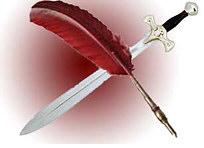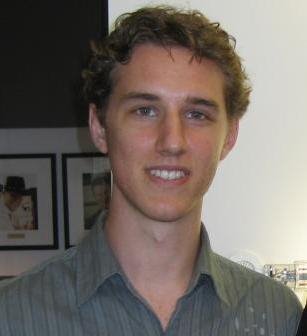KCB201: Breaking [not stroking] the news
 For the last few assignments, I've been doing a bit of research into new media and, in particular, the role of bloggers and the effectiveness of blogging.
For the last few assignments, I've been doing a bit of research into new media and, in particular, the role of bloggers and the effectiveness of blogging.There is this widely viewed concept that now `everyone's a journalist` [page of links], and I came across a number of articles that explained bloggers aren't really journalists in a true sense of the word.
I don't think they are; I don't think bloggers who, like me, discuss news can call themselves anything more than commentators or diarists. Let's face it, we're just congregating a bunch of news items [more credible than ours] together and providing our personal view. We don't automatically assume the same position of `journalist` just because we link to a journalist's story.
The idea of participatory cultures is certainly prolific, but this idea that everyone can now become jornalists just doesn't gel when you think about the very nature of consumer-based content. There should be an emphasis on `consumer`.
Until we become professionally qualified to produce information for paid consumption we are merely consumers creating content; heavily biased, ill-informed content.
I think it's too grandiose to call what I'm doing in this blog `journalism`.
I wrote a feature article recently on Australia's free trade agreements with the US, and discussed the options of an FTA with China and ASEAN. In order to write this, I had to first read and research widely on the topic; what FTAs we were involved in, the results of them, who the Australian Government was proposing FTAs with, the implications of them; Australia's stance within the world's economies; who wanted free trade, why; who didn't want free trade, why; then I had to take an angle - Australia should balance our unfair AUSFTA with an innovative FTA with a strong economic region; S-E Asia.
Then I read as many news articles I could to see what the media were saying about the topic, and figure out the possible advantages and disadvantages of an FTA with S-E Asia, and made sure my argument was watertight. Then I found out what the Australian Government, Mark Vaile, John Howard, Trade Opposition Spokesman, Kevin Rudd and Kim Beazley had to say about free trade and take their comments into account and quote them.
Then I had to structure the essay properly, making sure I made my point accurately and fluently using nothing but facts.
THAT is journalism. Journalism is a time consuming activity that [should] regard fact, relevance and ethics above laziness, money and convenience.
Yes, we are becoming more empowered to stake our claims to the public, but who in the public? The technorati? Left-wingers, the far right? Or are we actually reaching anyone or are we just shouting our comments into the cyber-abyss?
Without the foundations provided by a proper news organisation, citizens can not call themselves journalists. Journalists break the news, bloggers [like me, in this blog] simply stroke the news. I disagree with the idea that we can do everything through our computers - GET OUT THERE PEOPLE, go and research a story with real news values, interview people, structure the story, take into account the ethical guidelines of free information and publish your article somewhere.
News bloggers would not exist without journalists, but journalists would [I'm sure] quite happily do without bloggers.
--
image courtesy of DreamFactoryInk




0 Comments:
Post a Comment
<< Home